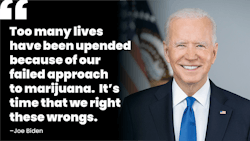
On Oct. 6, President Joe Biden announced a three-step cannabis reform plan to pardon thousands of people with past simple federal cannabis possession offenses, compel governors to do the same at the state level and initiate a review of cannabis’s Schedule I designation on the Controlled Substances Act (CSA).
When the news broke, many in the industry applauded Biden’s move and the significance of a sitting president calling the country’s regulation of cannabis a “failed approach.”
“The first time a sitting U.S. president has acknowledged the failure of federal marijuana policy is a really big deal, especially coming from Joe Biden, someone who has traditionally not been friendly on this issue,” says Kris Krane, who has advocated for cannabis reform for years, was at the helm of multistate cannabis company 4Front Ventures and is now a strategic consultant. “Not only did President Biden do this, but he did it weeks before a midterm election, which would indicate that he believes this is politically beneficial.”
Biden’s announcement recognized that the federal government’s assessment of cannabis’s risk and criminalization of the plant simply don’t make sense—what many cannabis reform advocates have been shouting for more than 50 years, when cannabis was first classified under the CSA as a Schedule I drug, among the most dangerous and addictive substances with "currently no accepted medical use."
“This is the same schedule as for heroin and LSD, and even higher than the classification of fentanyl and methamphetamine—the drugs that are driving our overdose epidemic,” Biden’s statement reads.
Past reviews of cannabis’s classification in the CSA—the most recent of which took five years and ended in 2016—have never moved the needle with the Drug Enforcement Agency (DEA), but many wonder if this time will be different with the directive coming from the president.
The official White House release on Biden’s plan is fewer than 350 words, but many more have been written on how the state-legal cannabis industry would be impacted if cannabis were rescheduled to a lower classification (Schedule V being the least restrictive) or descheduled and regulated more like alcohol and tobacco. Although it’s too soon to predict what might happen, the sentiment from industry experts has ranged from celebratory to panicked.
Depending on how the law is interpreted, some believe the DEA is obligated under an international treaty to keep cannabis in the most restrictive Schedule I or II classes and that descheduling—seen by many as the best-case scenario for the industry—will be highly unlikely. Rescheduling might mean even more oversight than what the industry is experiencing now and a complete shift in consumer access. Or, a reschedule could not mean much at all if the federal government chooses to let the state programs operate as they are.
Myriad possibilities exist. Cannabis Business Times unpacked all of this in an exclusive feature available at here and will continue to follow this story as more information becomes available.
And, on Nov. 7, CBT and Cannabis Conference are hosting a free, live webinar on "Rescheduling or Descheduling: How Future Federal Decisions May Impact the Industry," exploring the schedule review process, what cannabis operators can do in the event of more federal oversight and more.
In the meantime, Krane suggested operators not dwell on what happens next or implement business changes based on hypotheticals.
“Rather than trying to prepare for what life’s going to look like after this process, what folks in the industry need to be doing is reaching out to everybody they know in D.C. and trying to help influence or help impact the ultimate recommendation here,” he says. “How you adjust your business to deal with a new world where this is Schedule II is very different than a world where it’s descheduled.
“[What] we really need to be focusing our time on for the next year or so is using every tool at our disposal to help move the process in a positive direction.”

























